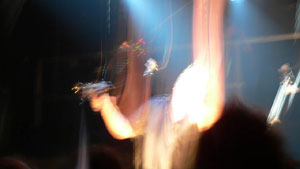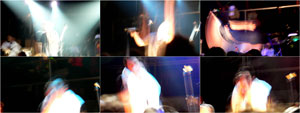
Easy To Swallow ~ Yasanao Tone/Hecker, Mark Stewart & The Maffia, Aphex Twin, Whitehouse
SEOne, London, 1st June 2005. All Tomorrow’s Parties
Russell Haswell has organised this evening’s portmanteau
feast of acts. Given his rep as artist/noisemaker it’s unlikely that anything
he curates is going to be straightforward or live up to the title he gives it
and so the evening, for the most part, goes to prove. We arrive just in time
to catch the beginning of Yasanao Tone and Florian Hecker’s set. The two
men stand motionless as dry ice billows about them, atmospherically illuminated
by UV lighting. From their minimal instrumentation they coax squalls of writhing
electronic noise that crash repeatedly into the audience. The combination of
calm immobility on the part of the performers and the aural attack that buffets
the crowd makes for a notable, though not exactly unfamiliar, contrast. At one
point a steady, persistent tone pierces the sonic maelstrom – it’s
the sort of distressing sound developed by military R&D labs to disrupt
the enemy’s concentration. As the sound continues, Yasanao Tone looks
up and calmly surveys the crowd for a minute or two. As it dissolves he turns
back to his instruments.
After a deal of setting up, the redoubtable Mark Stewart joins his band onstage. That band comprises Keith LeBlanc, Skip McDonald and Doug Wimbish, known at various times as Stewart’s Maffia, Tackhead and, back in the day, the Sugarhill Gang. Together with Stewart they represent a number of righteous, fascinating histories. Stewart himself looks like a heavyweight prizefighter, thickset in black leather jacket and matching gloves which he soon jettisons. The man has stage presence, despite the occasionally corny poses he strikes (raised fist, pointed finger, etc.) which might prompt guffaws if attempted by somebody with less gravitas. The notably diverse crowd are packed in tight as Stewart snarls into a small megaphone amplified by the mic it’s pointed at. The Gang meanwhile deliver a grin-inducing roar of mashed-up, heavy metal funk awash with dub and noise. Generous amounts of the latter threaten to dissolve the music into so much sonic magma. Stewart announces Resistance Of The Cell as “an old punk number”: it might be punky but it’s also wickedly danceable with a killer groove laid down by Skip ‘Little Axe’ McDonald. The set proves disappointingly short due to the evening’s scheduling demands, but it’s to be hoped that Stewart’s joke about “not being back for another 10 years” remains just that.
Richard D. James stays out of sight for the duration of his one and a half hour DJ set. Someone reports that he’s secreted behind a speaker stack, but ascertaining whether or not that’s the case proves impossible given the sardine-like press of the crowd. James plays an ever-mutating collage bookended by passages of stuttering beats. Given his popularity, it seems inevitable that the crowd respond positively to his set. The music manages to tirelessly reinvent itself with shades of acid, techno and much analogue mayhem while remaining recognisably Aphex-like in flavour. Given the anonymity of the delivery and the persistence of the attack the set runs out of steam a quarter of an hour or so before its end, but until that point remains a pleasure. Aphex is succeeded immediately by Whitehouse who turn out to be the last act of the night for your correspondent. The group effect an abrupt change of mood akin to teleporting from the Sahara to the Antarctic. The freezing chill is achieved by an ear-wilting scree of noise manufactured by William Bennett on laptop while Philip Best screams barely-comprehensible imprecations in a nasal whine. In response, the atmosphere tenses with a mixture of puzzlement and animosity as detritus begins to rain down on the duo. One man angrily screams abuse at the stage before storming off while Surgeon and his cohort stare down smugly at the throng from the raised VIP platform behind the stage. A strange end to an excellent evening.
After a deal of setting up, the redoubtable Mark Stewart joins his band onstage. That band comprises Keith LeBlanc, Skip McDonald and Doug Wimbish, known at various times as Stewart’s Maffia, Tackhead and, back in the day, the Sugarhill Gang. Together with Stewart they represent a number of righteous, fascinating histories. Stewart himself looks like a heavyweight prizefighter, thickset in black leather jacket and matching gloves which he soon jettisons. The man has stage presence, despite the occasionally corny poses he strikes (raised fist, pointed finger, etc.) which might prompt guffaws if attempted by somebody with less gravitas. The notably diverse crowd are packed in tight as Stewart snarls into a small megaphone amplified by the mic it’s pointed at. The Gang meanwhile deliver a grin-inducing roar of mashed-up, heavy metal funk awash with dub and noise. Generous amounts of the latter threaten to dissolve the music into so much sonic magma. Stewart announces Resistance Of The Cell as “an old punk number”: it might be punky but it’s also wickedly danceable with a killer groove laid down by Skip ‘Little Axe’ McDonald. The set proves disappointingly short due to the evening’s scheduling demands, but it’s to be hoped that Stewart’s joke about “not being back for another 10 years” remains just that.
Richard D. James stays out of sight for the duration of his one and a half hour DJ set. Someone reports that he’s secreted behind a speaker stack, but ascertaining whether or not that’s the case proves impossible given the sardine-like press of the crowd. James plays an ever-mutating collage bookended by passages of stuttering beats. Given his popularity, it seems inevitable that the crowd respond positively to his set. The music manages to tirelessly reinvent itself with shades of acid, techno and much analogue mayhem while remaining recognisably Aphex-like in flavour. Given the anonymity of the delivery and the persistence of the attack the set runs out of steam a quarter of an hour or so before its end, but until that point remains a pleasure. Aphex is succeeded immediately by Whitehouse who turn out to be the last act of the night for your correspondent. The group effect an abrupt change of mood akin to teleporting from the Sahara to the Antarctic. The freezing chill is achieved by an ear-wilting scree of noise manufactured by William Bennett on laptop while Philip Best screams barely-comprehensible imprecations in a nasal whine. In response, the atmosphere tenses with a mixture of puzzlement and animosity as detritus begins to rain down on the duo. One man angrily screams abuse at the stage before storming off while Surgeon and his cohort stare down smugly at the throng from the raised VIP platform behind the stage. A strange end to an excellent evening.
Colin Buttimer
Published by Grooves
magazine



